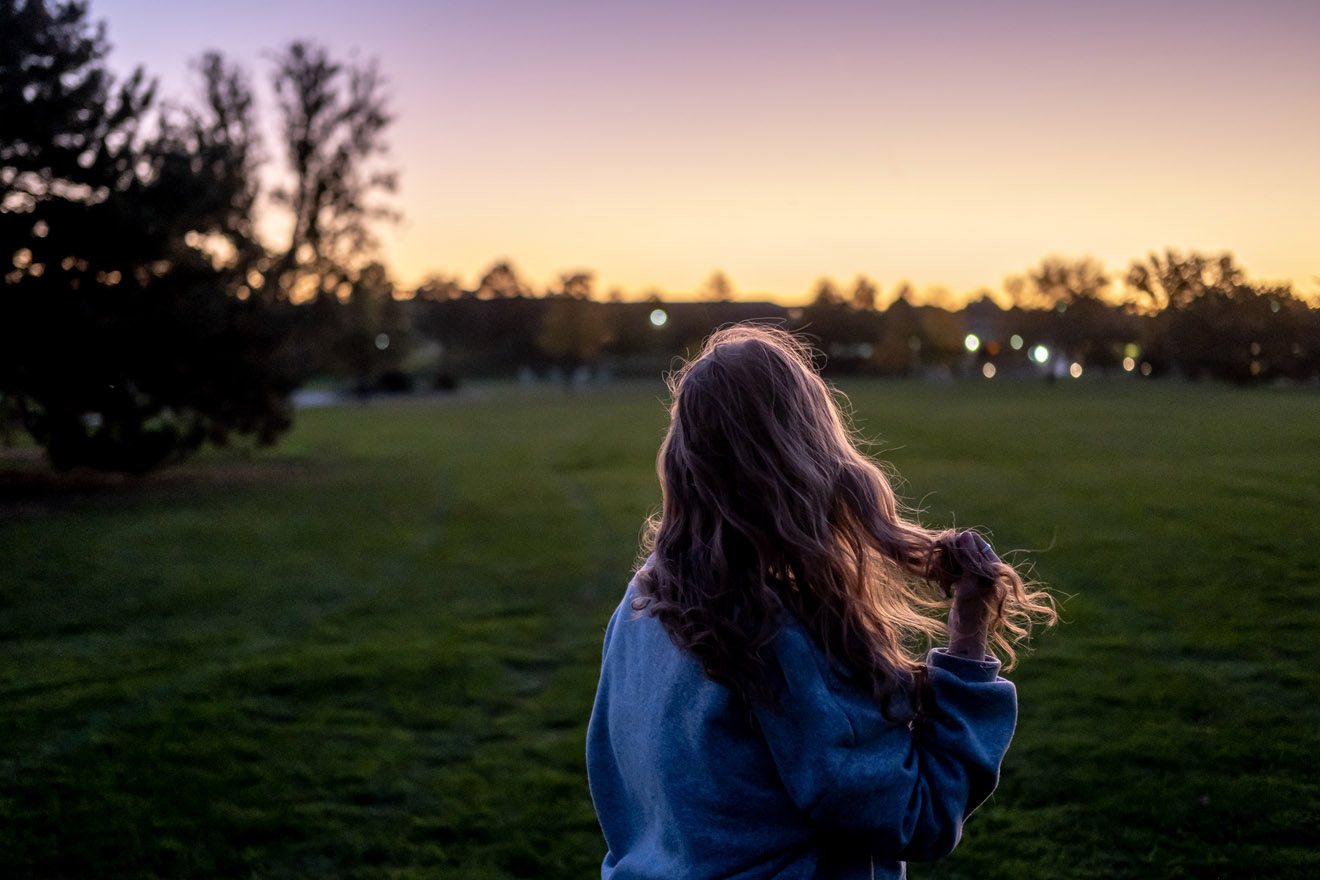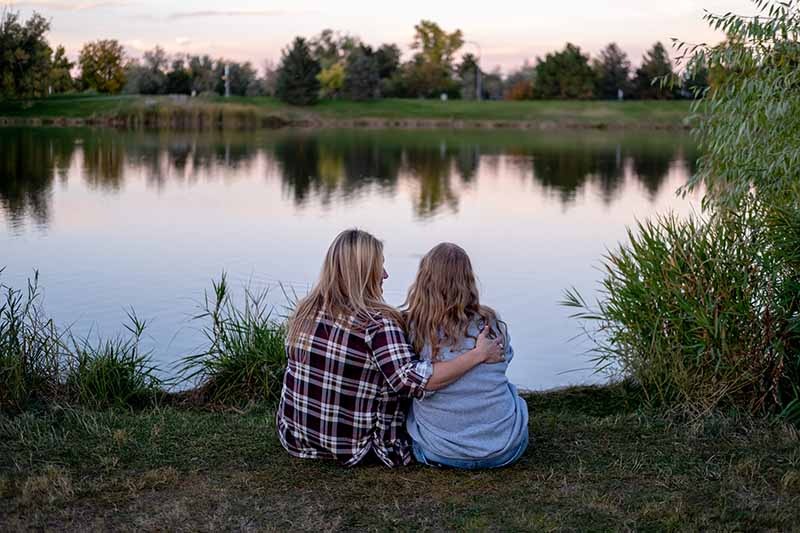
Allie Martin, 17, of Greeley, Colo. has spent years receiving treatment for depression—often at significant expense to her mother. (Names in this story have been changed to ensure privacy.) Photos by Eli Imadali / Special to The Colorado Trust
Allie Martin, 17, of Greeley, Colo. has spent years receiving treatment for depression—often at significant expense to her mother. (Names in this story have been changed to ensure privacy.) Photos by Eli Imadali / Special to The Colorado Trust
For much of childhood, Allie Martin was a happy kid—positive, extroverted, always wanting to help people. But around 2019, when Allie was in eighth grade at a school in Greeley, Colo., that shifted.
“Her personality went just a little bit dark,” recalled Allie’s mom, Melissa. (Both names have been changed to protect Allie’s privacy.) Allie started isolating herself. She didn’t want to be hugged, and she stopped showering regularly, according to Melissa.
“Even before COVID, I was starting to struggle,” said Allie, who is now 17. To cope with her anxiety and depression, Allie started seeing her school counselor on a weekly basis. Allied recalled that the support was helpful, but eventually, the counselor told Melissa that Allie would benefit from additional mental health treatment.
So Melissa found an outside counselor who Allie began seeing every other week. The care wasn’t great.
“She just kind of tried to be more of a friend than a counselor,” said Allie, explaining the woman didn’t provide Allie with tools or guidance on how to help herself, but instead delivered platitudes like, “It’ll be okay,” or “You just have to keep going.”
Despite the lackluster support, “we didn’t have a whole lot of options,” said Melissa. That’s because after calling multiple therapists, the woman turned out to be one of the few who was covered under Melissa’s insurance. Even with private insurance, though, each session cost Melissa $50 out of pocket—a hefty price for the single mom.
“I’ve always had a good job,” said Melissa, who is an administrative assistant. Melissa’s income is high enough that she doesn’t qualify for Medicaid or other governmental aid programs, but low enough that shelling out an extra $50 each therapy session “kills the budget.”
Her finances are so tight that at the end of each month, Melissa often looks around the house to see what items she can sell on Facebook Marketplace so she can afford groceries. Paying for Allie’s therapy sessions was a challenge, but Melissa was willing to do what it took to get her help.
Colorado’s youth mental health crisis is growing. Because of barriers including cost and access, an untold number of families like the Martins struggle to get their kids the care they need.
“Depression, anxiety is running rampant,” said Michele Lueck, executive director at Partners for Children’s Mental Health and senior clinical instructor in the Department of Psychiatry at the University of Colorado School of Medicine. In 2021, 39.6% of middle and high schoolers reported experiencing depression symptoms, up from 31.4% in 2017, per the Healthy Kids Colorado survey.
Additionally, “we see overwhelmed emergency departments, not only at Children’s Hospital, but at other hospitals across the state,” said Lueck. In May 2021, Children’s Hospital Colorado declared a state of emergency over youth mental health in response to their pediatric emergency departments and inpatient units being “overrun with kids attempting suicide and suffering from other forms of major mental health illness,” Jena Hausmann, CEO of Children’s Hospital Colorado, said in a press release. In May 2022, the hospital system reported that the situation was only worsening.
A confluence of factors—including the social isolation of the COVID-19 pandemic, behavioral health workforce shortages and inadequate insurance coverage for mental health care—have contributed to the crisis, said Lueck. Both federal law and Colorado state law mandate parity in mental health coverage; essentially, health insurers must cover care for mental and behavioral health the same way they cover treatment for other conditions, like diabetes or hypertension.
However, said Lueck, “we know that enforcement hasn’t been as strong as the law itself.” About 9.6% of children in Colorado with private health insurance, or some 22,000 kids, don’t have coverage for mental health, according to a 2021 Mental Health America report. Moreover, many private-practice mental health professionals don’t accept Medicaid or other forms of insurance, further limiting access to care.
“It’s really difficult to find people that can provide care to a particular demographic group, in this case youth, that are also taking insurance or Medicaid,” said Ray Merenstein, executive director of the National Alliance on Mental Illness’s Colorado chapter.
Certain demographics, including Coloradans of color, those with low incomes, members of the LGBTQIA+ community and those who live in rural areas, face even greater barriers to accessing care, said Merenstein.
Work is underway to attempt to ease the crisis. Last year, for instance, Colorado lawmakers passed House Bill 21-1258, which created a program called “I Matter” that provides kids with up to six free therapy sessions after they do an online needs assessment. Additionally, a task force dedicated to revamping the state’s Office of Behavioral Health and creating a Behavioral Health Administration finished its work earlier this year. The task force proposed that approximately $111 to $141 million of Colorado’s unallocated federal pandemic relief funds go toward improving youth mental health resources, including expanding youth residential care, community services, and school and pediatric behavioral health care integrations.
Even so, there’s still a long road ahead.
“The systems that we have in place right now are not giving care to everyone who needs it,” said Lueck. Case in point: More than a third (39.3%) of Colorado kids with depression did not receive any mental health care in 2021; and more than half (56.9%) of kids with severe depression did not receive consistent care, according to the 2021 Mental Health America report.
And even when families are able to access care, it’s not always robust enough to address their child’s issue.
Take Allie, for example. After six months of seeing the outside counselor, her mood only worsened. She started drinking vodka before school. Then, the COVID-19 pandemic arrived.
“COVID hit and my mental health shot straight into the gutter,” said Allie. In April 2020, isolated at home during lockdown, Allie tried to kill herself: she took a large quantity of Benadryl, thinking that would be enough to end her life.
Melissa found out about the attempt and took Allie to Mountain Crest Behavioral Health Center in Fort Collins, where Allie stayed for five days. The hospital stint, Allie remembered, was difficult, mostly because there wasn’t much group interaction due to COVID-19 restrictions. Instead, kids spent most of the time alone in their rooms.
Additionally, Allie recalled a counselor there responding negatively when she disclosed some of her past trauma. Allie can’t remember exactly what the woman said, but “essentially, it felt like she had called me a whore.” Later that night, Allie harmed herself in the hospital, and when the woman found out about it, “she just kind of waved over that.” (UCHealth, which operates Mountain Crest Behavioral Health Center, declined to comment for this article.)
Allie came home feeling “not great,” she recalled. As is protocol after a suicide attempt, Melissa locked up all the knives, medicine and alcohol in the house—which made Allie feel worse.
“It just kind of felt like oh, I’m actually insane—like, everybody sees me as an insane person,” said Allie. “I was struggling, but I wasn’t going to grab the butter knife and stab myself—like, it just felt crazy.”
After that, Melissa sought next-level care for Allie at North Range Behavioral Health in Greeley. At North Range, Allie started seeing a mental health professional every week, and was prescribed medication to treat anxiety and depression.
“We went through like four or five different meds,” recalled Allie. “And, you know, it was either like, this one doesn’t do anything. This one, I literally cannot function. This one, I feel like I’m gonna throw up the entire time. It’s a really long process of trial and error, which is really difficult.”
The teen continued her counseling sessions at North Range, but Melissa’s insurance stopped covering the care after she’d reached the insurance policy’s limit of 12 sessions. Melissa stopped paying the bills because she couldn’t afford them, and the facility’s accounting department didn’t come after her. Her focus, Melissa said, was just making sure Allie stayed alive.
Allie continued to struggle with her mental health. She attempted suicide twice more and went back to a behavioral health hospital three more times in less than 12 months. Some of those stays were more helpful than others, remembered Allie.
For a solid six months, when Allie was at home in between hospital stays, Melissa braced herself every morning as she opened the door to Allie’s room. “I would take this breath and it was almost like, could I smell death?”
Melissa knew Allie needed the next level of care but couldn’t fathom how she’d pay for it. In 2020, between therapy sessions, emergency room check-ins, and visits to behavioral health hospitals, Melissa spent about $12,000 out of pocket on mental health care for her daughter, which exhausted her savings. She was borrowing money from whomever she could.
“There were several times I was like, do I quit my job to get on Medicaid so that she can be taken care of? Because that’s how I could have ensured that she was getting help,” said Melissa. “That makes me feel like a failure, even though I was trying to help my daughter.”

Melissa and Allie.
Melissa started having morbid thoughts about what would happen if she couldn’t get Allie more help. What songs would she play at her funeral? What pictures would she use?
“If you do not have what you perceive as a mental health crisis issue on your hand, you do not understand it,” said Melissa. “You do not understand how hard it is.”
Then, a godsend: Staff at North Range told Melissa that she and Allie were likely candidates for support under Colorado’s Children and Youth Mental Health Treatment Act (CYMHTA), 2018 legislation that allows families who aren’t eligible for Medicaid to access mental health treatment services for their children.
The CYMHTA was passed by the Colorado legislature as an update to legislation first enacted in 1999. It’s intended as an alternative to child welfare involvement. Before the act, uninsured or underinsured families whose children needed intensive mental health treatment may have turned to child welfare. To access the funding, these families would contact Child Protective Services, who would open “dependency and neglect” actions—even though there wasn’t any child abuse or neglect in their home.
Having an open dependency and neglect action would sometimes lead to unintended consequences, including the parents losing their parental rights or encountering employment issues. “CYMHTA was designed to catch that particular population,” said Stacey Davis, the CYMHTA program manager within the Colorado Behavioral Health Administration.
In the state’s 2021 fiscal year, 246 Colorado youth were served through the act, a 33% increase from the previous year and the highest number ever served. Still, tens of thousands of other Colorado kids lack access to mental health care resources.
“I wish it was easier for people to find what they needed,” said Melissa. “If you’re in crisis like we were, day by day matters. If it takes years to get the help I need, every day I’m taking risks with my daughter’s life.”
Melissa applied for assistance under the CYMHTA program and was approved in early 2021. Since then, she’s only had to pay 7% of Allie’s mental health care bills out of pocket. With that support, Melissa was able to get Allie increased and more frequent care: semi-weekly therapy, including sessions with a substance abuse counselor; biweekly neurofeedback (a type of therapy that purports to help regulate brain waves); and appointments with a psychiatrist every other month. Allie finally got on a medication that works, and it’s made a world of a difference, said Melissa.
Without the financial support afforded by the CYMHTA program, “I know in my heart and my gut that I could have kept fighting, but she wouldn’t be here,” said Melissa. “What I could get on insurance wasn’t going to save her.”
Today, Allie is a junior in high school. Life isn’t perfect, and there are still struggles, but she has made strides in managing her mental health. She has scaled back to one counseling session per week, and her counselor recently told her they could meet less frequently if she wanted.
In her free time, Allie likes to take photographs and create art. A lot of her art relates to mental health, and her counselor has hung up some of her framed work in his office. In addition, she has a job at a local restaurant. She’s doing well in school. And she dreams of a career in photojournalism.
“There’s always the high school drama and challenges and anxiety, but because we have this constant care… that’s really stabilized her,” said Melissa.
Looking ahead, Allie isn’t sure what she hopes for in the future. “I’m trying to not plan ahead too much,” she said, “because I don’t want to get caught up in the details.”
What is certain is that now, she is better equipped to handle whatever mental health hurdles come her way.
“I have my safety net of people, of coping skills,” she said.
